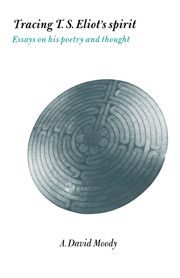3 - Peregrine in England
Published online by Cambridge University Press: 05 November 2011
Summary
It became a commonplace that once settled in England Eliot made himself ‘more English than the English’. The phrase itself is peculiarly English. (Would one say, in the United States, ‘more American than the Americans’?) The discrimination depends upon an exact sense of what constitutes ‘English’ behaviour within, of course, a select English milieu. The dark pin-striped suit, double-breasted or three-piece, the bowler hat and the rolled umbrella, might be impeccably correct for the Foreign and Colonial department of Lloyds Bank in the City; but Eliot's going down into the country to visit with a four-piece suit made his Bloomsbury friends snigger. Such niceties are the stuff of snobbery, and of caricature. The snobbery is in the perception of the foreigner as an outsider trying too hard to get in, and offering the natural tribute of imitation to a superior culture which equally naturally looks down on his give-away exaggerations. In this context ‘more English than the English’, meaning ‘not really English’, is a patronising put-down. But exaggeration is the essence of caricature, as Eliot remarked when studying the theatre of Marlowe and Jonson. And it is very possible – though the thought seems not to have disturbed those who observed his performance – that Eliot was not so much seeking to conform to certain stereotypes of the Englishman as straight-facedly caricaturing them.
- Type
- Chapter
- Information
- Tracing T. S. Eliot's SpiritEssays on his Poetry and Thought, pp. 39 - 59Publisher: Cambridge University PressPrint publication year: 1996



